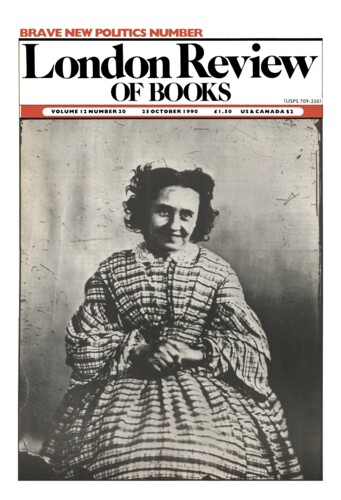Ian Gilmour
Ian Gilmour edited the Spectator in the 1950s when Karl Miller, the founding editor of the LRB, was its literary editor. He became a Conservative MP in 1962 and was Lord Privy Seal for the first two years of the Thatcher government. A Tory ‘wet’, he wasn’t sympathetic to her policies and regretted not resigning before she could sack him. His books include Dancing with Dogma: Britain under Thatcherism (a picture of Gilmour and Thatcher dancing together can be found on the cover of the LRB of 9 July 1992) and The Making of the Poets: Byron and Shelley in Their Time. He died in 2007.
Holding all the strings
Ian Gilmour, 27 July 1989
Macmillan’s premiership started at near rock bottom, with his party in disarray following the Suez debacle – it was not at all certain that the Government would last more than a few weeks. It reached its peak with his towering victory in the 1959 General Election, and it stayed for a time on a fairly high plateau, until economic troubles and deflation, the sacking of a third of his Cabinet, the failure of Britain’s application to join the Common Market, and the Profumo case, sent his fortunes down almost to where they had been in 1957. And yet his stock was soon to rise again, and if it had not been for the resignation that resulted from a faulty prognosis – largely his own – concerning his health, it would probably have returned to its previous peak with the winning of the 1964 Election.’
In Praise of Middle Government
Ian Gilmour, 12 July 1990
The collapse of the Communist regimes of Eastern Europe and the dire condition of the Soviet Union have left Socialism almost irredeemably discredited. Understandably, the recent Labour policy document tactfully avoided the subject. Such reticence is of course nothing new. Unlike Continental parties, even the old ILP kept ‘Socialist’ out of its title to avoid offending the workers; and the Labour election programme of 1929, largely drafted by Tawney, did not mention the word ‘socialism’. Labour’s recent socialist flirtation was an atypical, though not unprecedented folly – the Party indulged in similar sectarian extremism in the Thirties – which is unlikely to be repeated. Certainly if Labour is to face the future with any hope of electoral prosperity, it will have to be resolutely social-democratic both in rhetoric and in action. Outside the Third World, socialism is dead and will not be resurrected for some time to come.’
Conservatism
12 July 1990
The Way Forward
Ian Gilmour, 25 October 1990
In Britain, oppositions do not win general elections; the economy occasionally wins one for them. To prevent it doing so, governments in the second half of a Parliament devote much of their energy to ensuring that on election day the voters will feel prosperous and the economy look healthy. Such a political and economic miracle entails much dumping of dogma and convictions. Child benefit, say, which has been frozen in previous years, is at last uprated in line with inflation. Public expenditure, formerly regarded as a disease that must at all costs be curbed, now becomes a sign of health that must be fostered. Similarly, even in the days when Labour was supposed to be a socialist party, the dreaded word was banished in the run-up to an election.
Pieces about Ian Gilmour in the LRB
Hail, Muse! Byron v. Shelley
Seamus Perry, 6 February 2003
Ian Gilmour’s deft and learned book is concerned with the lives of Byron and Shelley up to the morning on which Byron woke up and found himself famous. The poets weren’t to meet for...
Why One-Nation Tories can no longer make an impression on the political establishment: Gilmour’s Way
Ross McKibbin, 16 April 1998
Ian Gilmour is one of the most leftwing figures in British politics: a feat he has achieved by not moving. He remains upright amid the ruins of a Keynesian political economy while the two major...
Stormy and prolonged applause transforming itself into standing ovation
Ross McKibbin, 5 November 1992
Ian Gilmour could scarcely have timed the publication of this book better. The last few weeks really have been a Marxist ‘conjuncture’: a heightened moment when social realities can no...
Not Many Dead
Linda Colley, 10 September 1992
Ian Gilmour is a distinguished and highly intelligent example of a once rare species: he is a Conservative with a cause. Unfortunately for him, however – and perhaps for the rest of us as...
Leaving it alone
R.G. Opie, 21 April 1983
Sir Ian Gilmour has written a splendid book about a splendid subject. The question he asks is: ‘How did Monetarism capture the Conservatives?’ It is a genuine mystery, and also a very...
Read anywhere with the London Review of Books app, available now from the App Store for Apple devices, Google Play for Android devices and Amazon for your Kindle Fire.
Sign up to our newsletter
For highlights from the latest issue, our archive and the blog, as well as news, events and exclusive promotions.




